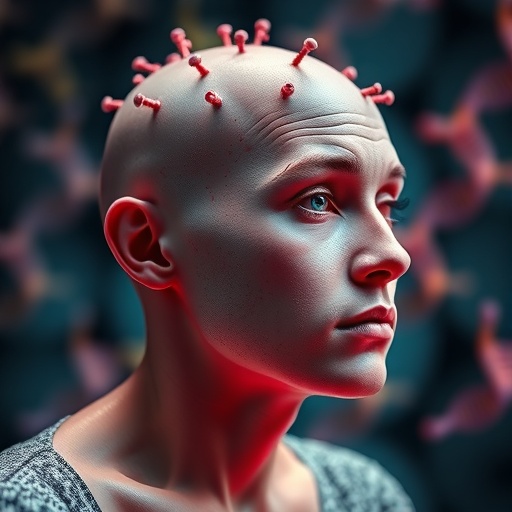In a groundbreaking revelation poised to redefine the scientific landscape of psychiatric genetics, Dr. Najaf Amin, an esteemed Associate Professor at the University of Oxford, has unveiled transformative findings that are set to challenge and expand the global understanding of depression’s biological underpinnings. With a prolific output exceeding 350 peer-reviewed publications and an h-index of 125, Dr. Amin leverages her expertise in molecular epidemiology to introduce a cutting-edge, multi-omics framework that transcends traditional paradigms.
Depression, long perceived through the narrow lens of neurotransmitter imbalances, is now being reinterpreted by Dr. Amin as a complex systemic disorder. Her pioneering research shifts the focus towards an integrative biological network, incorporating genomics, epigenomics, metabolomics, and microbiomics to decode the multifactorial pathogenesis of this devastating condition. This holistic approach reshapes the investigative models employed worldwide, beckoning a new era of personalized medicine.
Central to Dr. Amin’s discoveries is the elucidation of the RCL1 gene’s rare coding variants, a breakthrough that emerged after traditional genome-wide association studies (GWAS) hit a plateau in explaining depression’s heritability. The identification of RCL1’s mutation and its connection to primate-specific interlaminar astrocytes opens unprecedented pathways for therapeutic intervention. This finding suggests that cellular mechanisms within astrocytes — the brain’s glial support cells — play a significant role in mood regulation, challenging the prevailing neuron-centric hypotheses.
Beyond single-gene effects, Dr. Amin’s leadership in the largest epigenomic and metabolomic analyses to date has illuminated 124 metabolites intricately linked to major depression, with nearly 40% representing novel biomarkers previously uncharted in scientific literature. Such discoveries delineate new molecular signatures capable of predicting disease onset, progression, and treatment responsiveness, heralding a paradigm shift toward biomarker-guided clinical protocols.
Furthermore, integrating gut microbiome data into this multi-layered omics approach reveals a critical axis of brain-gut interactions influencing neuroinflammation and metabolic dysfunction in depressed patients. Dr. Amin’s research underscores the bidirectional influence between systemic physiological networks and central nervous system disturbances, implicating immune dysregulation, hypothalamic-pituitary-adrenal (HPA) axis disruptions, and oxidative stress as central facets of depression’s intricate pathology.
Her conceptual framework posits feedback loops among biological, psychological, and social dimensions, advocating for a nuanced understanding of how these factors interdependently sustain and exacerbate depressive syndromes. This recognition prompts a reevaluation of treatment strategies worldwide, steering away from one-dimensional pharmacotherapy towards multimodal, individualized interventions that consider patients’ molecular profiles alongside psychosocial context.
Dr. Amin’s own scientific journey mirrors the resilience inherent in her research philosophy. Hailing from Pakistan, navigating the challenges of academia as a woman of color, and overcoming significant early career setbacks, she embodies the tenets of perseverance and innovation. Her narrative spotlights the vital role of mentorship and diversity in fostering scientific breakthroughs across global boundaries, emphasizing the need to dismantle systemic biases in research environments.
Scientifically, Dr. Amin’s commitment extends to explicating rare genetic variants within diverse populations, a crucial endeavor to ensure that genetic insights translate into equitable clinical benefits. Her studies indicate that population-specific genetic architectures necessitate tailored therapeutic designs, a perspective that counters the one-size-fits-all model dominant in psychiatric genetics.
Looking ahead, Dr. Amin envisions an integrative model experimentally verifying causal pathways from environmental exposures through molecular changes to clinical manifestations. This comprehensive causality mapping aims to revolutionize prevention and treatment by enabling targeted disruption of pathogenic processes at multiple biological levels.
Open access publication via Genomic Press exemplifies her dedication to democratizing science, ensuring that researchers globally—especially those in resource-constrained settings—can harness these insights to accelerate advancement. This approach fosters an inclusive scientific ecosystem primed for collaborative innovation and cross-disciplinary synthesis.
The profound implications of Dr. Amin’s research resonate beyond academic circles, influencing public health policies, clinical guidelines, and societal perceptions of depression. By framing depression as a systemic disease with widespread physiological consequences, her work elucidates its role as a major contributor to increased morbidity and mortality, challenging healthcare systems to adopt preventive and therapeutic strategies aligned with this complexity.
As part of the Innovators & Ideas series, Dr. Amin’s interview in Genomic Psychiatry delivers not only a beacon for cutting-edge research but also an inspiring narrative of human determination and scientific vision. This synthesis of personal insight and professional excellence invites a broader audience to engage with the transformative potential of contemporary psychiatric genomics.
Dr. Najaf Amin’s revelations stand poised to reverberate across continents, catalyzing a research renaissance that promises more precise, equitable, and effective approaches to a condition that affects millions. Her integrative, multi-omics strategy marks a pivotal advance in psychiatry’s pursuit of unraveling depression’s mysteries and tailoring care that truly aligns with individual molecular identities.
Subject of Research: People
Article Title: Najaf Amin: Rare coding genetic variation and downstream omics hold the key to understanding the pathogenesis of depression
News Publication Date: 14 October 2025
References: DOI 10.61373/gp025k.0089
Image Credits: Najaf Amin, University of Oxford
Keywords: Depression genetics, RCL1 gene, multi-omics, molecular epidemiology, epigenomics, metabolomics, gut microbiome, systemic disease model, personalized medicine, psychiatric genomics, molecular biomarkers, integrative medicine




